- Home
- Phillip Tomasso
Arcadia (Book 1): Damn The Dead Page 11
Arcadia (Book 1): Damn The Dead Read online
Page 11
“Interview?” Tony said.
“It’s what it is, isn’t it? You are trying to decide if you want to stay in Arcadia, and to be frank, we’re also here to decide if we want you.” Vincent leaned back in his chair, crossed one leg over the other. “This has become a close knit community. Self-sufficient. We pride the progress we’ve made on maintaining order, expecting civility and compassion. Everyone has a job to do, and everyone works hard at the job assigned. We have doctors, and garbage collectors. We have farmers and factory workers. There are firefighters and school teachers. No task is unimportant. Without functions being performed, this —all of this— won’t work, it can’t work. If people slack on their responsibilities, Arcadia falls apart. I know this must sounds like some kind of political spiel, but I am giving it to you straight.”
Vincent watched their reactions. The small group remained silent, perhaps letting sink in the information just shared. It was a bit overwhelming, he supposed. Seated before him was a different breed of survivors. He might not know their backstories, but just by the looks of them the last several years have taken a toll. He knew he was fortunate, having been part of Arcadia from the beginning. The land was purchased by preppers more than two decades ago. The wall that turned the town into a fortified city took years and countless dollars to erect. “Questions?”
“How are people compensated for the work they do?” the young woman said.
“And you are, Charlene?”
“Char.”
“Char. That is an excellent question,” Vincent said. He stood up and walked slowly toward one of the windows. The mini-blinds were closed. He parted them with a finger and peeked outside. People moved about, on the way to work, on the way home, headed to and from the marketplace. “Currently, it is something of a socialist economy. Everyone performs their job to the best of their ability and everyone shares in, well, everything. Most of the food is grown and harvested. We have canned food and bottled water, as well. We use that sparingly. Eventually, the goal is to reinstall a common currency and transfer from socialist to democratic, toward making things more like the way they were.”
“So a doctor performing heart surgery is going to earn the same as a guy picking up trash?”
“Mr. Dibella, is it?”
“Tony.”
“Tony, I’m not going to lie. Sometimes I wonder if the direction we want to head in is the right path. Pretty soon you will get a tour of the town. What I believe you will see is not just content, but happy people. To answer your question, yes. Someone who is in the O.R. all day is going to receive the same each week as someone who picks up garbage. There are no wages being paid. There are staples that everyone gets, regardless. Your break a shoelace, you receive a new shoelace. If a light bulb burns out, you are given a new light bulb. Unfortunately, other items are allotted. We call that allotment chips. For example, you want to serve chicken breasts and garden salad for dinner. That’s fine. You are allotted x-amount of chips per month. If you elect to use chips for one meal because maybe your family is celebrating a birthday, then so be it. The Mercantile keeps detailed records of who earns and uses what. Same goes at the Bent Elbow.”
“I’m Sam. Sam Gerringer. What is the Bent Elbow?”
“That is the one and only watering hole in Arcadia, Sam,” Vincent said. He made his way back to the table and sat down.
“And how exactly does that work?”
Vincent pointed a finger at the black woman, and cringed. “Don’t tell me,” he said. “Grace?”
She nodded.
Smiling, Vincent said, “People work hard. Day in and day out. While we don’t have an unlimited supply of alcohol, we do have alcohol. These mountains were also once very popular for moonshining operations. I won’t confirm or deny that outside the walls there might or might not be a few distilleries distilling. And it works exactly the same as the food and water. Each person, of age, is allotted x-amount of chips for recreational purposes. People are not permitted to commingle allotments, though. This way a person can’t spend food chips on moonshine. Does it happen? I’ll bet it does. I’ll guarantee it’s not from poor book keeping, but nothing in our laws prohibits people from trading the two different types of chips. A guy who lives alone, eats very little, but is more thirsty than most, might end up working out a trade so he can spend more time at the Bent Elbow than the Mercantile, if you follow what I’m saying.”
“Laws?” Char said.
Vincent cocked his head to one side. “You’ve met our sheriff, haven’t you? What good is having Sheriff Huber, if we don’t have rules and laws in place for him to enforce?”
“No stealing. No fighting. No murder,” Char said.
“Those are the highlights, yes. Add to that the basics, no arson, rape, burglary, domestic violence, and so on and so forth, and we’ve covered the bases. No different than any town or any city in pre-apocalyptic times.”
“How many people live in Arcadia?” Grace said.
“We have just over five hundred adults and seventy or so under the age of sixteen. Isn’t that right, Gary?” Vincent said.
Gary nodded. “Working with round numbers, yes. That sounds accurate.”
“With under six hundred people and in a place as serene as this, I imagine crime is low? Why would you need a sheriff?” Grace said.
“Our sheriff’s office consists of Peace Officers.” Vincent smoothed out his tie. “We still have crime. It’s not a lot, but it does happen. People like Sheriff Huber are necessary. We also have a D.A., a defense lawyer, and a judge. All licensed by the bar prior to the events of three years ago. They rule based on case law, and facts, same as courts did years ago.”
“And the sheriff and his deputies are the only ones with weapons in town?”
Vincent nodded. “That’s correct.”
“I’m curious how you power this place?” Char said.
“And I guess I’d like to know why you are letting people move in. I mean, why are you even considering us for, I don’t know what you’d call it, citizenship? If the community is working smoothly, everyone has a job to do and everyone is doing their job, why even entertain people like us?” Tony said.
“The power is something we’ll talk about later. Like I said earlier, it’s not something we just disclose to people,” Vincent said, addressing Char’s question. “The thing is that there is still some room to grow. There are still jobs openings that need to be filled. Some are pulling double duty. Rotating with others. There still is a cause for concern that people working that hard will suffer burnout. People get sick. Die. Leave.”
“Why would someone leave?” Char said.
“Why would people choose to trade food chips for moonshine?”
“You have that many job openings?” Char said.
“What’s that saying, many hands make less work?” Vincent smiled.
“Light work. Many hands make light work,” the deputy mayor said.
Vincent hoped no one noticed his smile crunch into a cringe. “You are right, Gary. Thank you.”
Tony said, “You mentioned a tour of the place?”
“That’s correct. I did,” Vincent said. “Are you interested in seeing the town?”
The four people at the table looked at each other, back at Vincent, and then all four nodded.
# # #
Vincent’s suit coat was back on the rack behind his desk. He’d loosened the knot on his tie and unbuttoned the top button. Standing by his window, a tumbler of whiskey on ice in his hand, he watched as Sheriff Huber led the four from City Hall toward the marketplace.
Chapter 13
Char wanted time alone with her friends. Sheriff Huber kept up a steady flow of monologue. He pointed out different businesses. She was most impressed that there were two tailors. Clothing didn’t grow on trees. Maintaining what they had was important. It made sense.
There were no vehicles anywhere. The power the mayor talked about must have been limited to electricity, moonshine, and not refined petr
oleum. People walked everywhere. Char did not miss eyes giving them a once over any more than they missed an equal seizing up from her. Several people greeted the sheriff, and nodded a silent hello to Char and the others. The sheriff waved, and said hello in return.
Char stayed close to Grace. While the woman’s questions over the last hour were helpful, she noticed Grace wince now and then. She was anxious to see if one of the Arcadia doctors could give her friend an exam and just ensure them that everything was all right.
“Is that a bakery?” Sam said.
“Finest bread and pastries for miles around.” Huber laughed at his own dark humor.
“If we decided we wanted to stay, and all of you decided you wanted us, what is there, like a vote or something?” Sam said.
Huber shrugged. “Nothing as formal as that, really. Because of our size, the mayor, deputy mayor, Rebecca Bowmen, and myself, get together and discuss the pros and cons.”
Char wanted to ask what defined a pro as opposed to a con, but didn’t. She wasn’t sure it was worth asking because she wasn’t sold on the place just yet. Everything seemed too perfect, too smooth. She might be only seventeen, but she’d learned long ago to reserve trust until earned.
“Rebecca Bowmen. Who is she?” Grace said.
They stopped in front of a white building. The tall steeple was complete with a bell in the bell tower. Some of the paint peeled off the clapboard. The wood steps were bowed. The handrails, also wood, were weathered and worn. Char worried if he ran a palm up them she’d be picking out slivers the rest of the day.
“Ms. Bowmen is the Arcadia priestess.”
“Priestess?” Sam said.
“She’s … Well, let’s just say she is a very spiritual person. I don’t know that she is ordained by any church, but she is in touch with a high power, and that much I am certain.” Huber shifted his weight from leg to leg, his hand resting comfortably on the butt of his revolver. “She’s also a highly intelligent person; has always reminded me of one of those contestants on Jeopardy. Know a little about everything. There’s not a conversation that goes on that she can’t contribute to in some fashion. She even helps George Hermann, one of Arcadia’s best engineers.”
“If she has a say in whether we’re allowed to stay, do we get to meet her?” Grace said.
Huber waved an arm toward the front door the white clapboard church. “She’s right inside, and if I’m not mistaken, she’s expecting us.”
Char wasn’t sure what to expect. They entered the church. It did not look different from small churches she’d seen around home. The main aisle led to an altar with rows of wood pews on either side. The center runner was red carpet. Stained glass windows let in some outside light. Mostly it was dark, shadows filled corners and crept out across the eggshell white ceiling. The only odd thing was the relics. She did not see a Crucifix or anything related to Jesus. On the wall behind the altar hung a dreamcatcher with an eagle in a web of beaded strings perched on the ring. Dangling from the ring were four large and long brown feathers. On another wall was a peace pipe and across from it a hatchet.
From somewhere inside incense burned; the odor strong and pungent.
“Priestess Bowmen?” Huber walked backwards down the aisle looking up toward what Char presumed was a balcony.
A woman emerged from through a beaded doorway. She had long, straight, raven black hair, and an olive skin complexion. Her nose was long and thin. She had dark eyes and white teeth. “Sheriff. I was hoping you would show, and these must be our newest candidates?”
Huber spun around. His hands went to his sides, his fingers played with his utility belt. “There you are,” he said. “Priestess Bowmen, I’d like to introduce you to. . .”
“Tony Dibella.” He held out his hand.
They each introduced themselves.
“Would you like me to stay while the five of you talk?” Huber looked fidgety. He didn’t seem to know what to do with his hands. Char thought she saw beads of sweat on his forehead. For some reason, the priestess made him uncomfortable.
“That won’t be necessary. I’m sure after we talk, they’ll be ready for lunch. I can walk them over to The Diner for something to eat, if that will be alright?” Rebecca never looked away from Huber. Her eyes stayed locked on him.
“That will be fine. I’m sure that will be okay. I’ll swing by and pick them up from there a little later,” he said, and then he bowed as he backed away from the priestess and slowly made his way back down the aisle toward the doorway they’d entered. “I’ll see you all soon.”
It wasn’t until the sheriff was gone and the door closed all the way behind him that Rebecca Bowmen smiled. She motioned toward the row of pews on the left side of the aisle. “Why don’t we sit down and talk; make this a little less formal?”
Tony, Char, Grace and Sam filed into a pew, and the priestess opted a pew two rows ahead. She knelt on the bench, and rested her forearms on the back, facing the others. “I think I’d like to start by asking if you have any questions for me?”
Sam raised his hand.
“You don’t need to do that, Sam,” Rebecca said.
“I guess I have a question. I hope this doesn’t sound rude, but are you like, are you. . .a shaman?”
Char looked from Sam to Rebecca, curious about how she’d answer.
“Shaman is Native American. I am not. I do consider myself like something similar to a shaman because I use magic to heal and prevent illness, physical, physiological and mental,” she said.
“Magic?” Sam said. Char thought he had rolled his eyes. She knew he was all about technology, computers and science. This wasn’t Oklahoma University. Infected roamed the earth. If monsters actually existed, why couldn’t magic.
“I know what you’re thinking. I don’t have some black cauldron that sits on an open fire where I stir in leg of frog, and eye of newt,” Rebecca laughed. “What I try to do is use things from nature as ingredients for natural healing.”
“Wouldn’t leg of frog and eye of newt be natural?” Sam said.
“I was thinking more about roots and herbs, but I suppose it will all depend on what ails you, won’t it?” she said.
“Point made,” Sam said.
“I might just have been imagining it, but the sheriff seemed awfully —I’ll say— apprehensive around you,” Tony said.
“Very perceptive,” Rebecca said.
“I noticed it, too,” Char said, and immediately regretted the words. It sounded like she wanted credit for being perceptive, as well. “Why was that?”
“I’ll tell you a story. It was maybe a year ago. The sheriff suffered from insomnia. He said every time he tried to sleep the only thing he saw were those decaying creatures. If he slept at all, he explained that he felt more tired and worn out when he woke up. He came to see me. The mayor suggested it to him. The sheriff was born and raised Baptist. I suspect he considered Indians, shaman and a priestess, like myself, to be more like New Orleans witches, casting spells and practicing voodoo. He didn’t think I could help him. He told me as much. He said he didn’t believe in the hocus pocus I practiced. I explained to him that he didn’t need to believe in anything for the medicine to work. He wasn’t having it.
“I mashed together a collection of herbs and other ingredients and told him to make a hot tea out of the prescription, and drink a cup, only one cup every night before bed, and that before long, he’d be sleeping like a baby,” she said.
“It didn’t work?” Sam said.
“Oh, no, it worked,” Rebecca said. “It worked so well that he even stopped having nightmares. Hasn’t had a one since, best I can tell.”
“And that’s why he’s uncomfortable around you?” Char said.
“Because it worked. Yes. That is why he is uncomfortable around me. Once a month though, like clockwork, he stops by to refill his prescription.”
“So you are a doctor?” Char said.
“I am a spiritual person. I can see, hear and heal. I do not pos
sess any more power than you do. The difference is that I am in tune with my surroundings. I try to be one with nature. I listen to the wind. I feel the leaves change color and fall from branches. I see through the eyes of eagles and hawks that soar above the mountain tops. I use these senses to heal pain that is physical and physiological, pain in the limbs and joints, and pains that deteriorate the mind and soul.”
Rebecca had spoken slowly. Char felt almost entranced listening to the words. In a way she felt in awe of Rebecca if only because of the inner peace that radiated from her.
“Like you, Grace. You have been recently injured,” Rebecca said.
It wasn’t anything supernatural. The injuries they’d earned were worn for all to see. Cuts and bruises were visible on all four of them. They’d come from tough times and were ready for worse.
Bowmen stood up. She moved out of the pew she was in, to the pew between them. She stopped in front of Grace. “Lean forward, dear.”
Grace was hesitant, but responded. She reached for Char’s hand, gripped it tight as their fingers laced together.
The priestess held out a hand and let fingertips trace along Grace’s brow, down the side of her face and under her chin.
Char shivered. She thought she felt electricity pass between their palms and almost pulled away.
“You are a strong woman, Grace. Your body and mind are strong. You are healing yourself right now, even as we speak,” she said.
When Char was finally able to look away from Rebecca, she saw the steady stream of tears roll down Grace’s cheeks.
There was heat between their hands. It nearly burned flesh.

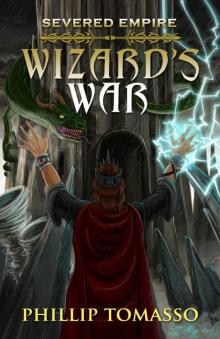 Severed Empire: Wizard's War
Severed Empire: Wizard's War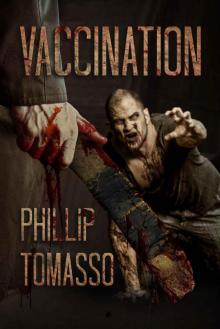 Vaccination - 01
Vaccination - 01 Extinction
Extinction Johnny Blade
Johnny Blade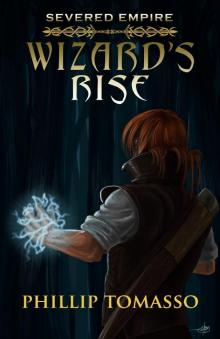 Severed Empire: Wizard's Rise
Severed Empire: Wizard's Rise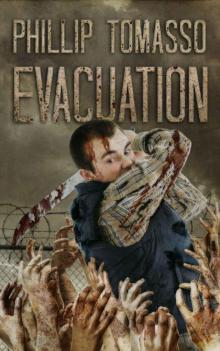 Evacuation - 02
Evacuation - 02 Absolute Zero
Absolute Zero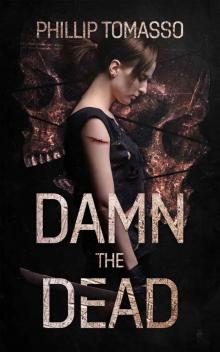 Arcadia (Book 1): Damn The Dead
Arcadia (Book 1): Damn The Dead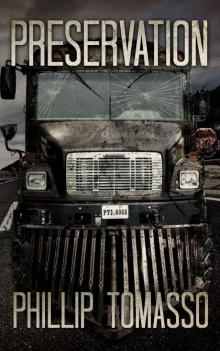 Preservation - 03
Preservation - 03